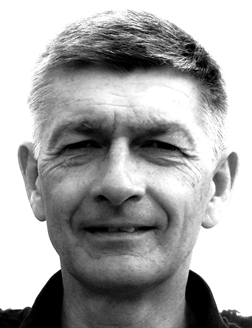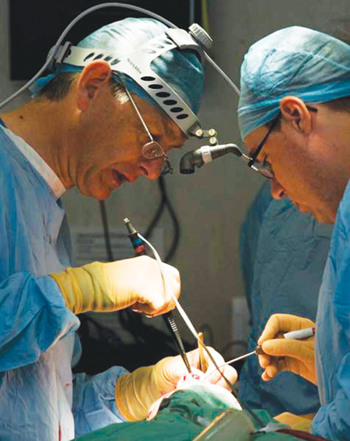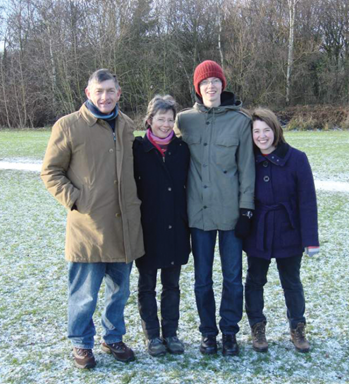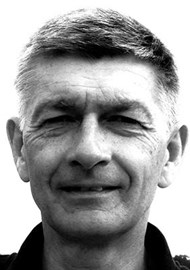“I admit to having felt vulnerable and anxious about exposing my work to scrutiny, and I still do.” From nasal reconstruction to poetry composition: retired rhinologist, Nick Jones - author of new poetry collection, Encounter - tells us more about his new avocation.

Nick Jones.
Tell me about the sequence of events leading to your retirement, i.e. was there a ‘eureka’ moment; was it incremental; what influenced your decision?
I enjoyed clinical work, teaching and research but about 18 months before I made the decision to retire I developed an autoimmune joint and muscle disorder. Drugs did a pretty good job of controlling my symptoms but my stamina was poor. I noticed that I was fumbling with simple things like pens and I worried that I was getting past my ‘best by’ date. Interestingly most of my problems resolved three months after I retired.
Tell me a little about your leisure interests and, particularly, how you came to write poetry / literature.
I have always enjoyed drawing and I took up etching on copper plates 12 years before I retired, but I only made time to do it two weekends a year. I also started playing golf on Sunday mornings around the same time. I had read some poetry in the past and enjoyed fiction, particularly on holiday. I had only written medical papers and books before and I had no intention of writing anything else. Soon after retiring I came across Virginia Woolf’s experimental novel, The Waves. Each chapter starts with the most beautiful and poetic prose. The rest of the book is difficult to follow, comprising only the conversation between characters you are told little about. It was the prose that I wanted to try and emulate.
Looking back I had a pretty shaky start but after a creative writing course I found a mentor to look at my jottings. By doing three or four hours writing most days, reading poems and asking for comments from others, I started to write work that I became happier with. For anyone who is thinking of starting writing, a good guide is Poetry, the basics by Jeffrey Wainwright.
What about the mechanics of writing? Do you use longhand? Keep notes? Chant the poetry aloud? Do multiple rewrites? Seek feedback from peers / family? Do you find it hard to start? JB Priestley said his first task when he sat down to write was to “lift the elephant off the typewriter” - a good description of writer’s block. Is that familiar?
It comes in fits and starts. If I get an idea I immediately write it in a small notebook as otherwise it will escape. I use a pencil and paper. Many of my ideas come from reflecting on life, daydreaming and glimpses of dreams, reading, walking and, most commonly, out of nowhere. If I have no inspiration then I work on poems I’m not happy with. I do a lot of rewriting but, in spite of many hours on some, they never come right. My reject folder is sizeable. Thankfully, sometimes they arrive in a matter of minutes and need little revision - these are often the best.
“Many of my ideas come from reflecting on life, daydreaming and glimpses of dreams, reading, walking and, most commonly, out of nowhere.”
I have had several days of the block that normally happens after a very productive period. I turn to something else and wait, as I can’t force it. Now it’s my default activity when I haven’t got a golf club in my hands! I should read my poems out more as this helps determine whether I’ve got the rhythm right and it discloses any awkward sounds that don’t match. My wife is a valuable critic of my work and when I’m happy with a poem I have two poets I know whom I ask for comments. Their advice is invaluable, although I don’t always follow it if I feel it dampens my voice.
You credit Virginia Woolf as an influence in the acknowledgements to your collection. Tell me a bit more about writers you admire / who may have inspired you.
Poets that do it for me are TS Eliot (‘Four Quartets’ and ‘The Wasteland’ in particular). Seamus Heaney explores the human condition in a lyrical and mystical way. Ted Hughes’s Crow is the most menacing work I have read, and a contemporary sequel, ‘Grief is the Thing with Feathers’ by Max Porter, is a mixture of beauty and darkness. Less well-known poets whom I admire are Owen Sheers and Jo Shapcott. I like a poem that gives you space to contemplate, has some rhythm and manages to add another dimension to its subject.
How did you get involved in the creative writing group?
I was surfing the web and found one with a small group of participants. I admit to having felt vulnerable and anxious about exposing my work to scrutiny, and I still do. Having now been to several groups, my experience has been that everyone is very conscious of trying not to undermine others’ efforts, and any comments are usually proffered tentatively and constructively. Most people realise that taste in poetry is very individual.
Did your collection, Encounter, give you as much joy as your many medical textbooks?
That’s a good question. My medical books gave me a sense of satisfaction but your choice of the word ‘joy’ describes how I feel about seeing some of my poems in print - along with surprise!
Your poems are very self-revelatory, focusing on childhood, relationships and memory. Was that sort of public display intimidating?
Honestly, I didn’t think about that aspect when I put pencil to paper. I was writing them primarily for myself. I don’t mind exposing weakness in myself in poetry as I hope that it may help others to reflect. In some ways, it is analogous to Omar Shaheen being so honest about his complications; he did that to help his colleagues and patients. I think that getting to know your own flaws and admitting them goes some way to dealing with them.
Did your medical writing help, or is creative writing a totally different skill?
My English master would probably be reaching for the aspirin if he knew that I was writing poetry. I was fortunate that my wife edited all my medical writing and over the years she improved my ability to write proper sentences. Creative writing is a skill built on that foundation but it needs structuring with the help of writing groups, reading, and trying to build up a feeling for rhythm and the wonder of words. Writing regularly is important.
Nick Jones operating.
How have your family and friends adapted to your new work / lifestyle?
They have always been very tolerant and they are used to me scribbling away, it’s just the topic that’s changed. Thankfully my wife enjoys playing the violin and piano, reading and singing so we convene for tea and a chat when we have had enough of our own company.
Do you miss medicine, surgery, the presentations / lectures, the patient feedback, the peer connections, the ‘adrenaline’ of a difficult case?
To be honest, I was getting tired of the sound of my own voice giving lectures. I tried to alter my lectures each time to give them some freshness but there are only a limited number of ways you can say something. I do miss the positive comments I got from patients and the camaraderie of my colleagues as well as the nurses and secretaries. I don’t miss the ‘adrenaline’ of a difficult case, and towards the end I became increasingly anxious that I would make a mistake; another reason for me feeling it was a time to put down the scalpel. I now wonder how I had the nerve to make a living from cutting people, particularly in doing the nasal reconstruction work.
Nick Jones and Family.
What next - a novel? Medical memoir is enjoying a vogue almost as a ‘genre’- e.g. Henry Marsh. Any plans for a prose work?
At my retirement party, a chest physician asked me if I was going to write my autobiography. I was taken aback - as I have already said, I had no intention of doing any writing at that stage. I have wondered about it since and I have been fortunate to have a varied life, including walking across Papua New Guinea, diving, interesting episodes operating abroad and more. However, I think that most autobiographies lie through omission and often distort the truth. Samuel Pepys is the best exception to this as he wrote his in code and didn’t expect anyone to decipher it. If I did write one, it would have to be truthful and that would mean burying it for two generations. I’m immersed in poetry at the moment and working on another collection to go alongside some of my etchings.
Any advice for those thinking about retirement?
I think it is a personal choice when to stop. I do know of several people who have struggled to find fulfillment in retirement, primarily because they hadn’t any interests outside work, but most are enjoying their last holiday.
Interviewed by Ray Clarke.







